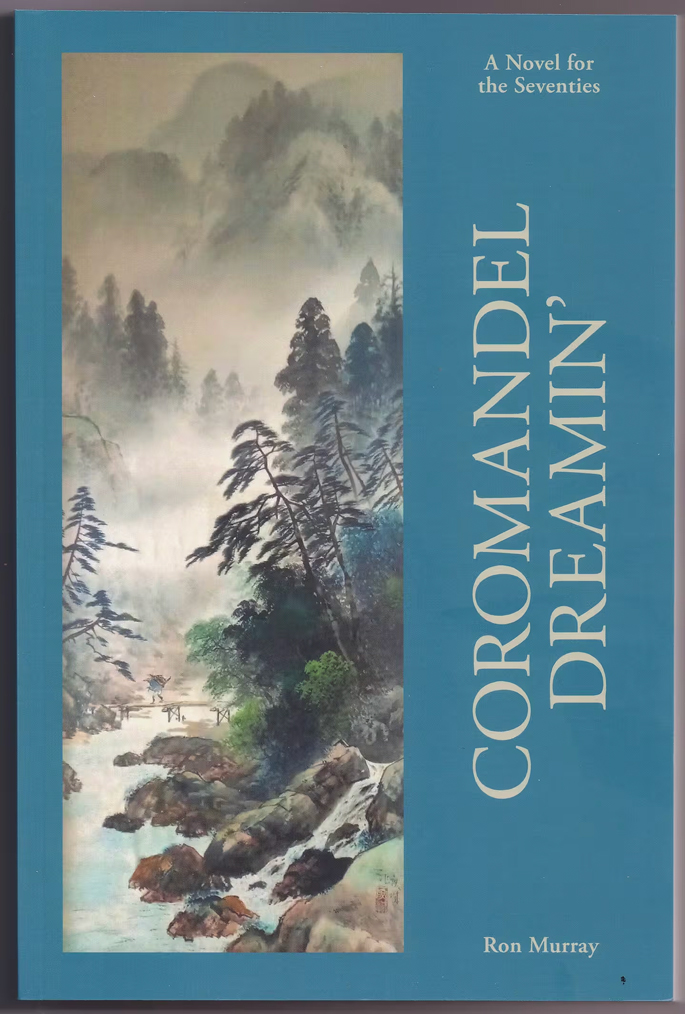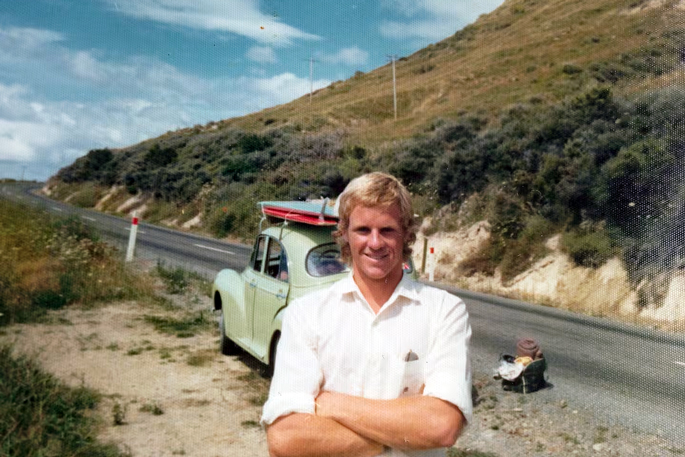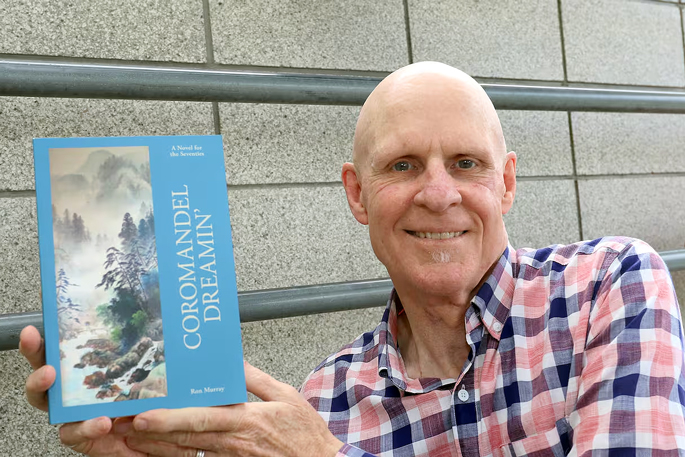For Pāpāmoa’s Ron Murray, the challenge of completing a novel has acted like a beacon on his personal cancer journey.
Written in acts rather than parts and scenes rather than chapters, Ron has just published his first novel, but not his first book, Coromandel Dreamin’.
Coromandel Dreamin’ has taken four years to write, roughly coinciding with an up-and-down battle against metastatic melanoma for its 66-year-old author, a retired corporate communication specialist.
He was first diagnosed with melanoma in 2009.
“I’d surfed all my teenage and younger years. Surfing was my sport year-round and through that childhood there was not a lot of attention to skin protection against cancer.
“I would surf two to three hours at a time getting a pretty hefty dose of UV, so those years, before I turned 20, largely determined my future now really.”
In 2009 melanoma, on his back, was cut out.
“I had 10 years’ remission after that, then in 2019 it came back on my collar bone and armpit. I had surgery to remove that, then went onto a drug trial, which worked for three years.”
But the cancer returned in 2022, was declared inoperable and has proven to be much more difficult to beat this time.
“The drugs I’ve been on up until now apart from the first one, didn’t really do much. They have slowed it a bit, but it still hung in there and grew.”
His latest scan has indicated some shrinkage of the internal tumours.
“That’s heartening, but I’m under no illusion, it’s one of those games, you keep plugging away and see how the future goes.”
The latest diagnosis coincided with a job change.
With a free week before starting his new job, Ron went to stay in a Coromandel bach intending to finish the novel.
Before he left he had had a routine scan, part of the ongoing monitoring after his previous bout of treatment.
“That came back and said [the cancer] had come back. My whole world shifted.”
He took the new job but, eventually, the fatigue associated with the treatment meant he could no longer work full-time.
Ron had previously written a book about internal communications - on the back of which he ran workshops - two poetry books and a book on meditation.
 Coromandel Dreaming' by Ron Murray.
Coromandel Dreaming' by Ron Murray.
But Coromandel Dreamin’ is his first completed novel.
“A novel is the holy grail. It’s like being a runner and aspiring to a marathon - or an ultramarathon.”
The book leapfrogged two other ideas he was working on.
“I had two others on the go, but out of the blue, this one cropped up.”
While he had already begun the book before the latest diagnosis, the goal of completing it, he says, acted as a beacon.
Set in the mid-north of the peninsula in the late 1970s, the novel is “a love story with elements of high drama”, says Ron, written to reflect a little of the Aotearoa of the time – and the beauty and allure of the Coromandel.
The book’s inspiration came from an old English ballad Thomas The Rhymer, made famous by 70s folk-rock band Steeleye Span.
“It tells the story of Thomas, who’s a musician just kicking round on some side road in old England when a woman on a white horse appears and invites him to jump up and come back to her place.”
The novel opens with a similar pickup – the lead character and narrator of the story is hitching through the Coromandel on a wet autumn, late afternoon when he gets a ride with a woman who has a small settlement in the backblocks of the peninsula near Coromandel Town.
Ron, who began his career as a high school English teacher before switching to journalism - including a stint on the Bay of Plenty Times and as editor of the Mount News), says the setting of the story was a no-brainer.
 Self-published author, Ron Murray from the Bay of Plenty, spent his younger days in the 1970s by Coromandel beaches. Photo / Ron Murray.
Self-published author, Ron Murray from the Bay of Plenty, spent his younger days in the 1970s by Coromandel beaches. Photo / Ron Murray.
“I spent my youth in the Bay of Plenty, which is an area I know well and love, but the Coromandel always had a sort of wild allure for a young guy growing up in the Western Bay of Plenty.
“As a kid, teenager and young adult I went there a lot, first with my family then as a surfer – holidaying, camping, exploring, tramping, surfing, diving, partying, shopping – some of my most abiding memories have a Coromandel backdrop.
“I regularly drove up the coast seeking surf at Waihī Beach, Whangamatā, Onemana, Pauanui, Tairua and as far north as Hot Water Beach. It’s my favourite coastline and the hinterland is utterly spectacular.”
He says his intention wasn’t to write a historical novel, but he did want to capture the times.
“The 70s was a transitional time for me as a young guy – I was a third former in 1970 and teaching my own third formers in 1979. I went from adolescence to adulthood in that decade.”
“But it was transitional for the country too – and the region. I saw it as a sort of shift in innocence: we were a pretty prosperous place with Britain buying most of our primary produce, then suddenly they’re in the European Common Market and it’s not so favourable for our farmers. Then Opec raises oil prices. Things got tougher and more real. Hard drugs started appearing in New Zealand.
“It wasn’t all bad: we had a short period of left-wing government under Labour and Norm Kirk where we took a stand on nuclear testing and addressed many decades of grievances by Māori with the establishment of the Waitangi Tribunal and the land claim process. And alternative lifestyles – environmental considerations, sustainability, organics and the like - started to gain a following.
“Then there’s the music of the times – which features in the novel. The 70s gets slagged off a bit musically at times but it fuelled my love for music and I still listen to many of those bands and singers 50 years on.”
He says people who have read the book, mostly friends and family, have said they enjoy it.
“There’s a a great deal of satisfaction in that.
“In many ways it’s a bit of a legacy, so if I was to die in the next two or three years, I’d be happy that I’d left something that helped people, that provided pleasure for people.”



0 comments
Leave a Comment
You must be logged in to make a comment.